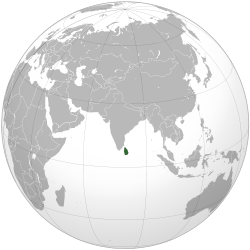Religious Tension In Mannar, Sri Lanka – OpEd
As displaced citizens of all religions return to their former homes, land issues and fishing rights in Sri Lanka are hugely contentious and – unless carefully managed by the government – can easily spill over into communal tension.
By the Sri Lanka Campaign
Mannar is a district in the north west of Sri Lanka. The area is almost entirely linguistically Tamil, but has always been religiously diverse – with traditionally sizeable Christian, and Muslim populations (amongst the largest and most concentrated such groups in Sri Lanka) as well as many who identify as Hindu.

In October 1990, the LTTE (the Liberation Tigers of Tamil Eelam) ethnically cleansed all Muslim residents from the parts of Mannar they controlled. In addition many people of all religions were displaced by both sides in the course of the civil war, or were forceably displaced by the Sri Lankan army to make way for military bases or on spurious security grounds. As a result, and as displaced citizens of all religions return to their former homes, land issues and fishing rights in Sri Lanka are hugely contentious and – unless carefully managed by the government – can easily spill over into communal tension.
To say that the Government of Sri Lanka has not carefully managed the process would be an understatement. The Government has already been successfully taken to court for establishing a land commission designed to favour the military. Furthermore communal tensions have been stirred up by Rishard Bathiudeen – a Government minister of Muslim faith with no particular role in events (he is the Minister for Industry) but who increasingly views Mannar as his personal fiefdom. Recently Rishard allegedly instigated an assault on a Magistrate’s court in Mannar while it was in session. The session in question had determined that fishing rights for a certain area were to be awarded to a Christian group over a Muslim one.
However, while the Government of Sri Lanka is being less than helpful, Sri Lankan civil society – in particular local Women’s groups – have been trying to calm community tensions. One group formed the Citizens Commission on the Expulsion of Muslims from the Northern Province – a grassroots attempt by Sri Lankan Muslim organisations to address community concerns. They released a report into the situation of Mannar’s Muslims earlier this month.
Additionally 203 women of Uppukulum village have made a statement to the Human Rights Commission of the UN (the body that assesses individual cases of rights violations). This Muslim village has undergone appalling harassment as a result of their legal struggle for fishing rights. They have also been tarred with the brush of Rishard Bathiudeen; as it was their village that was at the centre of the court case which led to the attack on the courthouse. Indeed many of the villagers were peacefully demonstrating their cause outside the Mannar courthouse when the incident occurred – but the villagers credibly claim they had no responsibility for the assault.
Harassment of these villagers has included:
- Use of teargas to disperse the crowd
- The police beating women and young girls present in the crowd
- 13 villagers being arbitrarily arrested and detained – including a 17 year old boy who had played no part in the demonstration
- Heavy handed searches of the villages and a further six arbitrary arrests. Policing has been so heavy handed that almost all the village’s men have now fled.
- Surrounding of the village by police at all times
- Continuous intimidation and harassment of the remaining women and children.
Meanwhile the Citizens Commission on the Expulsion of Muslims from the Northern Province has just released a statement in which they address some misunderstandings surrounding the report and call for a reasonable negotiated settlement between the communities. To quote the last two paragraphs of the statement:
The solutions to problems faced by the people in Mannar – both Muslim and Tamil – with regards to resettlement need to be attended to by giving due importance to the difficulties of both communities. The Muslims’ right to return should not be reduced to a critique of the political machinations of one representative or to a question of competition over resources for resettlement. There has to be sufficient thought, attention and resources devoted to finding solutions that reflect a minimum standard of acceptance by all affected communities.
It is possible that vested interests may subvert the amicable resolution of the fisher communities’ problems for their benefit. In the past we have seen that resource-distribution conflicts have been exacerbated into inter ethnic conflicts, we urge that the leadership of both communities learn from past experiences, and approach this with a deeper understanding and sensitivity towards the peaceful co-existence of Tamil and Muslim communities.
The Sri Lanka Campaign is a global non-partisan movement calling for a) effective humanitarian relief, b) an end to human rights abuses, c) repeal of anti-terror regulations and d) a credible war crimes enquiry.
This article was originally published on the Sri Lanka Campaign’s website, available by clicking here.
